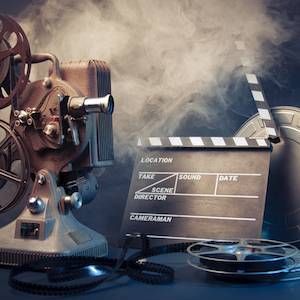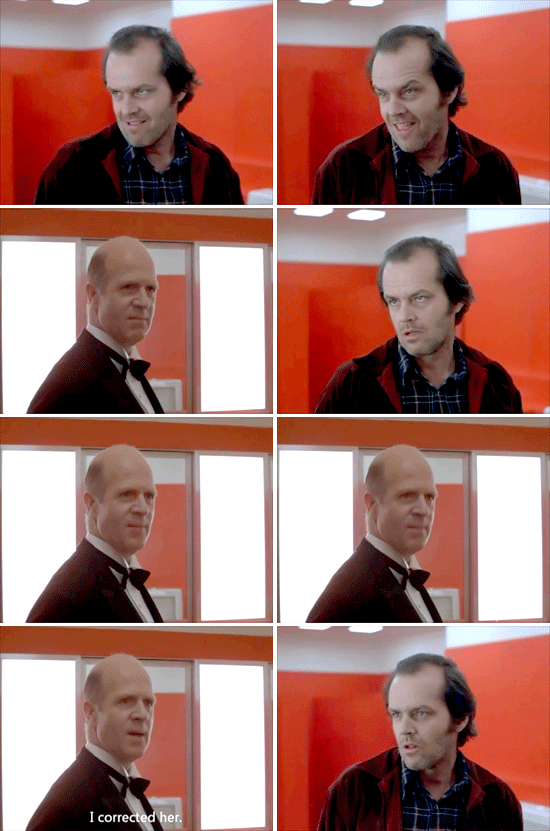
A Case For Making The Screen Adaptation Different From The Book
Every now and again, because I am a giant book nerd (in good company here, yes?), I get served links about authors who hated the movie adaptations of their books. Everyone knows, for example, that Stephen King has major beef with Kubrick’s version of The Shining; other beloved movies, like American Psycho, The NeverEnding Story, and Mary Poppins were also hated by the books’ authors (the author of Mary Poppins actually wept at the premiere). Some authors being upset, I get–a bad movie is a bad movie is a bad movie, adapted or not, but sometimes . . . .
. . . . sometimes, going off-script makes for a better movie.
(ducks before she gets pelted with rotten fruit)
1. Movies and books are unique storytelling media with different strengths. Bret Easton Ellis dislikes the film version of American Psycho because it lacks the unreliability and ambiguity of the novel (and also because the director is a woman and falls subject to “emotionalism”–whatever, BEE). I’d personally argue that the film did a pretty good job making Bateman unreliable, but that’s neither here nor there.
I like the book American Psycho and I also like the film American Psycho, and I like them for different reasons. The book happened mostly inside of Bateman’s head (so we are led to think), but a movie where we stare at a guy and trying to guess what he’s thinking isn’t much of a movie. Movies require action, so, to Ellis’s apparent chagrin, we have to see Bateman axe-murdering people whether it turns out he really did it or not. The novel is literary and the main punch is the ambiguity and unreliability of Bateman; the movie is visceral, powerfully exploring Patrick’s rage and desperation to fit in.
2. Sometimes the movie finds themes that the author maybe isn’t focusing on. I have a lot of feels about The Shining in both book and movie form; I have studied this book the way smarter people than I might study Ulysses. I was Team Steve on the issue of Kubrick’s adaptation until I recently flipped my script.
When I re-read The Shining as an adult, what made my hair stand on end wasn’t the ghosts, the topiary, or the woman in 217. It was Jack. Jack wasn’t a happy-go-lucky Everyman when he interviewed at The Overlook; he was a man who had been raised by an abusive father, a man who had broken his son’s arm while drunk and angry, a man who had punched the out the lights of a student under his care, a man who’d quit drinking cold turkey. Jack was already barely hanging on and the hotel job was his last chance. The book-Overlook worked him so slowly that he didn’t notice the abusive thoughts creeping into his head; you can’t put that kind of super-slow creep in a movie, but I thought this scene illustrated the horror well:
(I made this GIF and it took goddamn forever.)
King obviously has a point that the book focused on the evil of the Overlook, but the evil of abusive men is also very present in the book–we see Jack’s thoughts turn rotten over weeks and his father’s abusive influence take over with a nudge from the haunted hotel. Kubrick brought a more subtle monster out of the book and put it center stage.
Chuck Palahniuk admits straight out that he didn’t put everything together that he could have while writing Fight Club. “I felt so self-conscious. . . I was sort of embarrassed of the book, because the movie had streamlined the plot and made it so much more effective and made connections that I had never thought to make.”
3. Re-making the book scene by scene leaves nowhere for the story to grow.
Not only is it really just not possible to remake a book 100% faithfully (I mean, unless you have a couple of days to kill watching it), I also think that would be dull. It’s a story we’ve already read. Even if an adaptation is fairly faithful to the source material, the director still needs his or her own vision to bring the material to life in a new medium, lest you end up with a dead-boring-but-beautiful cinematographer’s wet dream. (So many literary adaptations in this category. So many.)
Some directors have crap vision, I won’t deny that. When you get the right mix of director and material, though, it’s movie magic in the making (even if it deviates from the book a bit–or a lot). The Godfather is one of the best examples of this; Coppola turned a so-so novel into a cinematic treasure. The Silence of the Lambs is another example of a director with a keen vision transforming the material in the book (though Demme deeply regretted leaving out clarifications about Buffalo Bill not being transgender and applauded the backlash from the LGBT community).
What say you, book fans? Do you scream when an adaptation goes off-book or is it okay as long as the movie is good? (Read even more of our thoughts on book adaptation here.)












